Goal 1: Students
Rejoicing that God works in us, we are equipped to . . .
Expand our students’ learning experiences through curricular resources,
experiential learning, and increased financial aid.
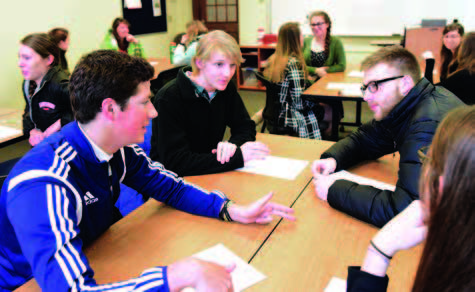
MLC students choose from several majors, preparing them for the many different
ways they can serve the church: preseminary studies, elementary education, Spanish,
instrumental music, early childhood education, secondary math, parish music, special
education, administration . . . the list goes on and on.
Initiative 1.1 directs us to establish a comprehensive and ongoing review of all degree programs. We’ll also evaluate and revise our secondary education majors to be sure we are best meeting the needs of the WELS high schools where our graduates will serve.
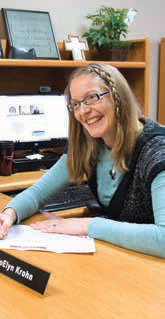 Financial Literacy Coordinator JoElyn Krohn earned Honorable Mention in a national Financial Educator of the Year Contest. This year Mrs. Krohn met with 279 first-years, transfers, and seniors, assisting them with budgeting, loans, credit cards, and debt management. One senior wrote: “The budget plan JoElyn created was a great tool. Although I know I have a lot more to learn, this was most beneficial in preparing for my financial future with my husband and in taking the necessary and appropriate steps for healthy financial living.”
Financial Literacy Coordinator JoElyn Krohn earned Honorable Mention in a national Financial Educator of the Year Contest. This year Mrs. Krohn met with 279 first-years, transfers, and seniors, assisting them with budgeting, loans, credit cards, and debt management. One senior wrote: “The budget plan JoElyn created was a great tool. Although I know I have a lot more to learn, this was most beneficial in preparing for my financial future with my husband and in taking the necessary and appropriate steps for healthy financial living.”
One objective of Initiative 1.2 is to expand this financial literacy education to our graduates who are already serving and paying off their college loans. Essentially, we want to do all we can to increase financial aid, ease our students’ debt-load, and educate them in good stewardship principles for their lives of gospel service.
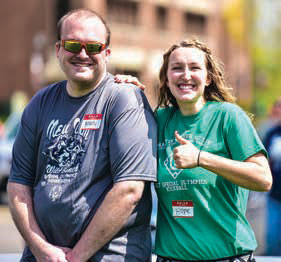 The Student Athlete Advisory Council (SAAC) hosted a kickball game with athletes from the New Ulm Wild Bunch Special Olympics in April. Two teams were organized with MLC student-athletes and New Ulm area people with special needs or disabilities. High fives, hugs, and signing autographs after the game made for a memorable day for everyone.
The Student Athlete Advisory Council (SAAC) hosted a kickball game with athletes from the New Ulm Wild Bunch Special Olympics in April. Two teams were organized with MLC student-athletes and New Ulm area people with special needs or disabilities. High fives, hugs, and signing autographs after the game made for a memorable day for everyone.
This is one kind of service project that Initiative 1.3 encourages.
In accordance with scriptural guidelines and Higher Learning Commission recommendations,
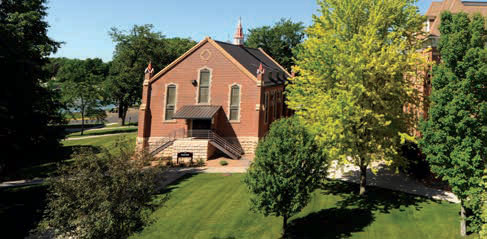
The Music Hall may see a “retro-reno,” a renovation that takes it back to its structural origins. Originally called the Aula, this 1911 hall with balcony was used as a worship and recital space for decades. In the mid-20th century, it was reconfigured into two floors of organ practice rooms.
Some of those walls may now come down, opening the space once again for recitals and rehearsals—as well as a new Institute of Liturgical Arts (Initiative 1.5) dedicated to honoring and worshiping God through all the creative arts.
 Rendy Koeppel DMLC ’81, principal at St. Paul/
Rendy Koeppel DMLC ’81, principal at St. Paul/
First-North Hollywood, left the MLC MS-Education program—to enroll in the MS-Educational Administration program instead.
“WELS educators need to be at the top of their game to best serve students and families,” he says. “This program helps me as an administrator to improve and better serve my Lord, my school, my congregation, and our synod.”
According to Initiative 1.6, the MS-Educational Administration degree will evolve into the exclusive means of training principals and ECE directors, replacing other less comprehensive training programs.
“This program focuses on the unique needs of WELS principals and ECE directors, who are more than simply administrators,” says Dr. John Meyer DMLC ’87, program director. “They’re a combination of principal, superintendent, and spiritual leader.”
 In May 2019 Samantha Sievert (Zion-Crete IL) will graduate with
In May 2019 Samantha Sievert (Zion-Crete IL) will graduate with
a double major in special education (SpEd) and early childhood education. The SpEd major, which was rolled out three years ago, was officially approved by the Minnesota Board of Teaching in May. When Samantha graduates, she will be qualified to apply for the Academic and Behavioral Strategist (ABS) license—and to serve a school and probably an entire region as a special education resource.
Initiative 1.7 envisions MLC having more than simply a major. The college will become a diagnostic center for children who have learning disabilities—beginning locally and expanding to become a district and synod-wide resource.
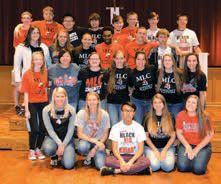 These 26 Michigan Lutheran Seminary (MLS) students are enrolling at MLC next year. That’s half of this high school’s class of 2017! We’re grateful to the MLS faculty and staff for their considerable recruitment efforts.
These 26 Michigan Lutheran Seminary (MLS) students are enrolling at MLC next year. That’s half of this high school’s class of 2017! We’re grateful to the MLS faculty and staff for their considerable recruitment efforts.
Our admissions department is always hard at work as well. Here are our 2016-17 recruitment efforts by the numbers:
750 – Focus on Ministry weekend visitors
100 – Other high school visitors
250 – Grade school visitors
10,000 – Off-campus admissions counselor
Initiative 1.8 validates all these excellent recruitment endeavors and urges even more. We want to focus not simply on filling current synod vacancies, but on preparing as many pastors, teachers, and staff ministers as we possibly can and then exploring new ways and places they can serve. “Open your eyes and look at the fields!” our Lord said. “They are ripe for harvest” (John 4:35).